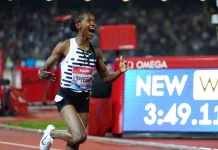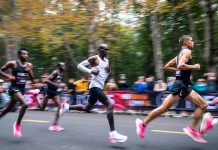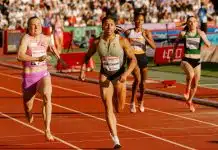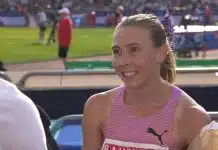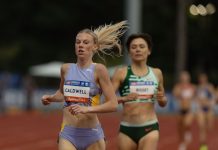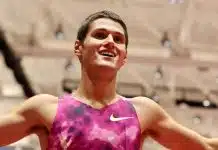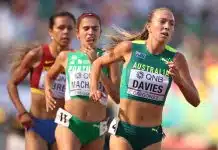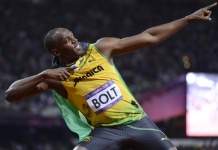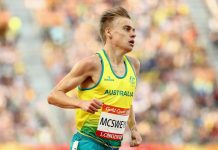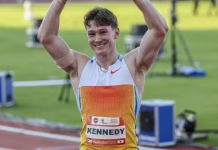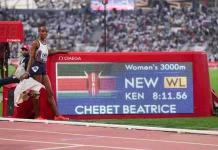By Chris Lotsbom, @ChrisLotsbom
(c) 2016 Race Results Weekly, all rights reserved
EUGENE, OR (07-Jul) — In every Olympic Trials there is a race that is remembered for its pageantry and magnificence, heartbreak and triumph. In 2008 it was the men’s 800m; in 2012 the women’s 5000m. Tonight, as the rain came down and a brisk wind blew, five women battled valiantly for the right to become 2016 Olympians in the 3000m steeplechase. The drama over the final laps was so intense that even the protagonists couldn’t keep things straight.
“It was such a blur,” said Collen Quigley, one of the women grappling for a spot on the podium.
Quigley would join winner Emma Coburn and runner-up Courtney Frerichs on a soggy victory lap, one that lasted upwards of 30 minutes and prolonged the celebration of a memorable and thrilling race.
Coburn scooted away with the victory, separating from the field in the last kilometer. Yet it was the spectacle behind that mesmerized the 21,835 in attendance.
For a majority of the race, Stephanie Garcia had done the work up front, pushing lap after lap next to Ashley Higginson all the while the field gathered a step behind. Garcia, whose tendency is to run hard in the first half, hung tough through 2000 meters and tucked in for second while Coburn made her drive for the win.
Even with two laps to go, Garcia looked like she had a comfortable cushion on the chasing three: former Michigan State star Leah O’Connor and Nike Bowerman Track Club teammates Quigley and Frerichs.
Sitting in the catbird’s seat ready to pounce, Quigley was first to overtake O’Connor for fourth. Moments later –with roughly 800m to go– Frerichs followed suit and edged past O’Connor. It was at this very point that the race changed drastically.
O’Connor had been dealing with a plantar fascia tear which worsened throughout the race. Upon leaving the stadium, she could be seen on crutches with ice on her foot, holding back tears. Despite pushing through the pain, she’d wind up 14th, and last, in 9:59.03. That, it turned out, was the first heartbreak of the event.
As soon as Frerichs passed O’Connor, she gained a surge of adrenaline. Coupled with the encouraging cheers she heard from coach James Butler at that very moment, she began to open up her stride and reel in not only Quigley (some five meters up), but also Garcia (about ten meters ahead).
“At 800 to go I kind of was in a bit of a darker place. I was like ‘I’m getting dropped and I’m hurting really bad,'” she told RRW. “Once I passed Leah I started getting a little bit of strength and I knew at 400 I could just sense I was really picking up the pace and gaining, gaining, gaining. I just told myself today when I came that I am not getting fourth. My coach [Butler] had told me, too, before the race that if there was a chance in the last 400 that I could potentially be close that I had one of the strongest last 400s. I was channeling that message through my head to get myself close.”
Frerichs’ form was absolutely perfect over the backstretch barrier and following water jump. The former UMKC Kangaroo and New Mexico Lobo drew even with Quigley, a step back of Garcia. Out of the water, the tandem seemed to swallow Garcia whole exiting the Bowerman Curve.
“I just got a burst and I was channeling everything that I had going into the last lap at NCAA’s” Frerichs said, referencing her collegiate record performance of 9:24.41 set here last month. “I just found that place again. It’s a very happy place and it gave me a lot more energy to finish hard.”
Garcia simply had no response. Her once five-second lead had evaporated, and was made worse when she caught her leg on the final barrier, taking a tumble to the ground.
“That’s how it goes,” said Garcia, speaking at length with the media and searching for a positive to take from today. “We have seen at these Trials that there are a lot of amazing athletes who are not Olympians. Hopefully I’m one of them. It’s just time to get down from the emotional cliff and get ready for the summer season.”
The Olympic team was set, with Coburn finishing first in 9:17.48, Frerichs second in 9:20.92, and Quigley third in 9:21.29.
“I think the three of us, and a lot of the girls who didn’t make the team today, have more and more race confidence and our ability as steeplechasers on an international level,” said Coburn, reflecting on the national depth after securing her fifth national title in the last six years. “I think the more and more that we make finals and lower American records and have more and more women under 9:25 or 9:25, I think as a group we lift each other up and feed off of each other’s confidence in the event.”
For all the heartbreak that Garcia felt, it was pure joy for Quigley and Frerichs in particular. Coburn was the favorite and expected to advance to Rio, though Quigley and Frerichs were the two somewhat wildcards. Quigley has dealt with never-ending hamstring and hip injuries since before last year’s IAAF World Championships, and only began hurdling again three weeks ago. Frerichs had to set another PB to snag third in this race, a tough task considering the demanding NCAA schedule.
“That was really tough. I taught myself how to swim this fall because I was running out of cross training options this fall,” Quigley said. “Shalane [Flanagan] texted me this morning and just said when you’re out there today thing of all those hours and literal hours you spent in the pool and on the bike and on the elliptical, and on the Alter-G… That was exactly what helped for me. I was just like I’ve worked so, so hard to do what I love and that’s the running part.”
For close to a half hour the trio stayed on the backstretch and signed autographs for the fans despite the rain and awards ceremony procedures. They had just become Olympians, and nothing else in the world mattered.
“Is this real life?” Quigley could be heard asking Frerichs just before taking the media podium.
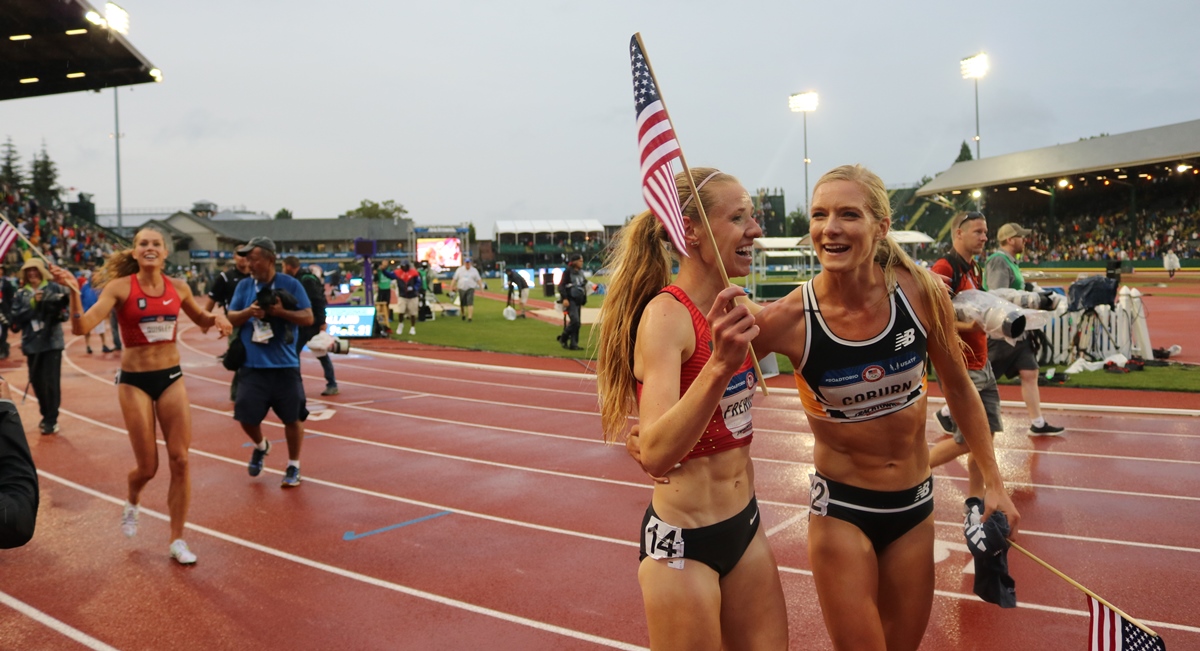
HUDDLE LEADS WOMEN’S 5000M QUALIFIERS
Molly Huddle said she enjoyed her 10,000m victory last Saturday for one day before turning her attention to the 5000m prelims. Taking the lead with five laps to go, the Providence, R.I.-based Huddle pushed the pace as assigned by coach Ray Treacy. She’d run her last 1600m in 4:45.10 to take heat-two unpressed in 15:26.33.
“Prelims can be tricky. We don’t do them a lot in the 5000m so I just wanted to make sure I didn’t go too hard out there,” said Huddle. If she was to finish in the top three in Sunday’s final, Huddle said she would likely not double in Rio de Janeiro. The reason not to double is that she’d rather take the two weeks after the Olympic 10,000m to focus on training for her marathon debut at the TCS New York City Marathon rather than the 5000m on the track.
“We are leaning against doing that just because of the marathon in the fall, ’cause I need those two weeks actually to start my buildup. But we’ll talk about that [if it comes up],” she said. “It’s just a hard double at the Olympic level.”
Katie Mackey (15:26.64), Shelby Houlihan (15:26.91), Allie Ostrander (15:27.13), Marielle Hall (15:27.61), and Abbey D’Agostino (15:29.66) rounded out the top six in the heat, by far the fastest of the two sections. This was Ostrander’s first race since suffering a stress fracture at the NCAA Indoor Championships.
Section one went to Kim Conley, who rebounded well after a disappointing 10,000m DNF due to a dislodged shoe. The NorCal Distance Project athlete said she immediately forgot about the 10,000m, using her energy to focus ahead rather than behind.
“It wasn’t that hard for me because it was a decision I made within the race [to drop out and focus on the 5000m],” said Conley, appearing very upbeat after her 15:40.04 win. “It was pretty easy to turn the page at that point and be excited that I get to stay here for the duration of the entire Trials.”
Hoka One One’s Kellyn Taylor (15:40.15), reigning national 5000m champion Nicole Tully (15:40.27), 10,000m Olympian Emily Infeld (15:40.35), and mother of four Sara Hall (15:42.70) finished off the top five.
Not advancing were Laura Thweatt (eighth in section one, 15:50.60) and Gabe Grunewald (11th in 15:58.72). Grunewald would return to run the 1500m in 4:18.07, automatically qualifying for the semi-final.
WITH ONLY THREE ELIMINATED IN WOMEN’S 1500M PRELIMS, ALL FAVORITES MOVE ON
Despite knowing only three of the 27 women toeing the line today would be eliminated, Jenny Simpson said all athletes had to respect the process and fight to advance to tomorrow’s semi-finals. Simpson established her position early and led from the gun, ultimately winning heat three in 4:17.31.
“In these rounds, if somebody comes past you, it’s not one person — it’s five people,” said Simpson, the 2011 IAAF World Champion. “That’s what you keep your radar up for. I do remember looking up at the board multiple times to see how the field was doing.”
Behind Simpson, Lauren Johnson and Shannon Rowbury wrapped up the top three in 4:17.53 and 4:17.80, respectively.
The fastest mark of the day went to Amanda Eccleston in 4:13.82. The Michigan alum unexpectedly found herself in the lead early in section one and embraced the feeling. Doing the pacing would turn out a blessing in disguise as she avoided the potentially disastrous collision between Rachel Schneider and Alexa Efraimson at the bell (both Schneider and Efraimson eventually advanced on time).
Brenda Martinez, Morgan Uceny, and Elise Cranny finished three abreast in the second heat, running 4:23.48, 4:23.48, and 4:23.59, respectively. Martinez said she did not dwell on her controversial 800m stumbleon Monday, and put the incident behind her as soon as she saw her pet dogs that evening.
Other notable finishers advancing on were high schoolers Christina Aragon and Kate Murphy (fourth and fifth in heat one, 4:14.06 and 4:14.11), as well as Mary Cain (eighth in heat three, 4:19.10).
FLOCK OF DUCKS AMONG MEN’S 1500M QUALIFIERS
Eight of the 25 men advancing out of Thursday’s men’s 1500m prelim have ties to the University of Oregon. Racing at their college home with little puddles forming on the track, the former –and a few current– Ducks had clear hometown advantage.
“It really feels like a home meet. The rain was a home meet kind of thing, a lot of things I’m used to so far,” said the B.A.A.’s Daniel Winn, who together with former Oregon teammate Johnny Gregorek led most of the first section.
The most prominent Oregon alum, Matthew Centrowitz, didn’t touch the lead and preferred to run from behind. He happened to be next to Nike Oregon Track Club Elite member and fellow Duck alum Andrew Wheating. The crowd responded when Wheating and Centrowitz moved up in the field and ultimately finished third (3:42.41) and fourth (3:42.48), respectively, in heat three.
“It’s just about staying patient, being relaxed and getting through the round as safe as possible,” said Centrowitz. “I definitely looked over my shoulder with about 50 to go and saw I was in the top six and I’m just happy to get through.”
The winners of the heats were Ole Miss Rebel Craig Engels (3:41.92), Ben Blankenship (3:49.61), and Eric Avila (3:42.27). Engels is returning after finishing a surprising fourth in the 800m.
Three of those eliminated were Ford Palmer (who fell during his race and lost contact with the group, timing 3:51.31) as well as former Oklahoma State Cowboy Chad Noelle (3:51.19) and Will Leer (3:54.31).
——
On Friday, the men’s steeplechase final will be contested, as will the men’s and women’s 1500m semi-finals.



